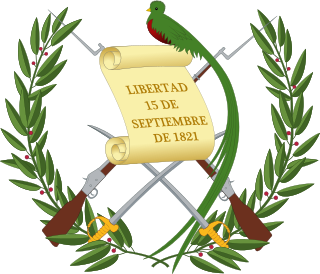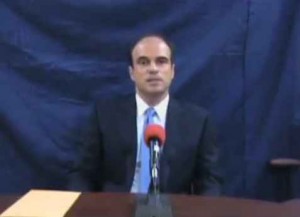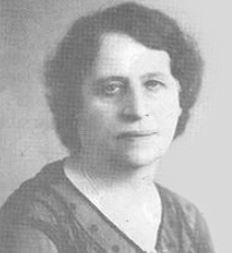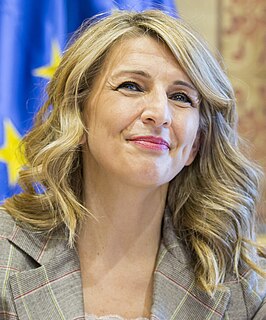Related Research Articles

Politics of Guatemala takes place in a framework of a presidential representative democratic republic, where by the President of Guatemala is both head of state, head of government, and of a multi-party system. Executive power is exercised by the government. Legislative power is vested in both the government and the Congress of the Republic. The judiciary is independent of the executive and the legislature. Guatemala is a Constitutional Republic.

Jorge Antonio Serrano Elías was President of Guatemala from January 14, 1991 to June 1, 1993.

Álvaro Colom Caballeros is a Guatemalan politician who was the President of Guatemala from 2008 to 2012, as well as leader of the social-democratic National Unity of Hope (UNE).
José Rubén Zamora Marroquín is an industrial engineer, entrepreneur, and the founder of three Guatemalan newspapers: Siglo Veintiuno in 1990, and El Periódico in 1996, and Nuestro Diario in 1998. He has been threatened and attacked on several occasions for his work, including being held hostage in his home in 2003 and being kidnapped and beaten in 2008.

The Universidad de San Carlos de Guatemala is the largest and oldest university of Guatemala; it is also the fourth founded in the Americas. Established in the Kingdom of Guatemala during the Spanish colony, it was the only university in Guatemala until 1954.

Dr. José Rafael Espada is a former Vice President of Guatemala and a former cardiothoracic surgeon.

Rodrigo Rosenberg Marzano was a Guatemalan attorney. Before his death, Rosenberg recorded a video message saying if he were murdered, Álvaro Colom Caballeros, President of Guatemala, Gustavo Alejos, Sandra Torres de Colom, and Gregorio Valdés would have been directly responsible. His subsequent killing caused a national uproar. After an investigation by a United Nations commission, officials declared that Rosenberg had arranged his own death and had contacted cousins of his former wife, Francisco José Ramón Valdés Paiz and José Estuardo Valdés Paiz, to hire a hitman.

Marta Harnecker was a Chilean journalist, author, psychologist, sociologist and Marxist intellectual. She worked in the analysis of the labor movement and elaborated many pieces of formative documentation. She was also an advisor to the socialist Marxist government of Cuba, as well as a collaborator with left-wing political movements in Latin America. She was active in the government of Salvador Allende between 1970 and 1973, and a counselor of Hugo Chávez between 2004 and 2011.

Giancarlo Ibárgüen was a Guatemalan businessman and academic. He served as President of the Universidad Francisco Marroquín from 2003 to August 14, 2013.
Vilma Reyes Díaz is a Puerto Rican poet, storyteller and educator. She has served as a teacher of Spanish language and has chaired the International Poetry Festival in Puerto Rico since 2010. She has been an influence on young Puerto Ricans in literary creation by offering free workshops for children and youth poetry and has published several books as a result of that work.
Lucrecia Méndez de Penedo is a Guatemalan university professor, essayist, researcher, and literary and art critic. She has been instrumental in rescuing some of Guatemala's literary heritage from obscurity.

Luz Méndez de la Vega was a Guatemalan feminist writer, journalist, poet, academic and actress. As an academic, she concentrated on researching and rescuing the work of colonial Guatemalan women writers. She was the winner of Guatemala's highest prize for literature, Miguel Ángel Asturias National Literature Prize, and the Chilean Pablo Neruda Medal, among many other literary awards throughout her career.

Argentina Díaz Lozano was the pseudonym for the Honduran writer Argentina Bueso Mejía. She was a journalist and novelist, who wrote in the romantic style with feminist themes. She won numerous awards for her books, including the Golden Quetzel from Guatemala, the Honduran National Literature Prize Ramón Rosa" and the "Order Cruzeiro do Sud" from Brazil. She was admitted to the Academia Hondureña de la Lengua and is the only Central American woman whose work has officially contended for a Nobel Prize for Literature.

Elena Sánchez Valenzuela was a Mexican actress, journalist and creator of the Mexican film archive. One of her country’s first silent film stars, she was also a feminist and suffragette.

Esther de Mézerville Ossaye was a Guatemalan teacher, feminist, suffragette and activist who worked to help women obtain the vote in Costa Rica.

Sister Juana de la Concepción was a Guatemalan nun, writer, and poet.

Carlos Enrique Luna Arango, popularly known as Cash Luna, is a Guatemalan televangelist and faith healer who is the founder and pastor of the Casa de Dios, one of the largest megachurches in Latin America.

Yolanda Díaz Pérez is a Spanish politician and lawyer specialised in labour law, serving as Second Deputy Prime Minister since 2021 and Minister of Labour and Social Economy of the Government of Spain since 2020. A member of the Congress of Deputies since 2016, she has previously been a former Ferrol municipal councillor (2003–2012) and member of the Parliament of Galicia (2012–2016). She was the National Coordinator of Esquerda Unida (EU) from 2005 to 2017.
The following lists events in the year 2020 in Guatemala.
References
- 1 2 3 Villalobos, Roberto (12 July 2009). "Hay esperanza de que las cosas cambien". Revista D (in Spanish). Prensa Libre (262). Archived from the original on 13 February 2016. Retrieved 14 June 2015.
- ↑ "Profesores de la UFM en Objectivist Conference". Universidad Francisco Marroquín (in Spanish). Guatemala City, Guatemala: Universidad Francisco Marroquín. Retrieved 14 June 2015.
- ↑ Zapeta, Estuardo (1999). Las huellas de B'alam : 1994 - 1996 (in Spanish) (1. ed.). Guatemala: Ed. Cholsamaj. p. acknowledgements. ISBN 9992253010.
- ↑ "Informe de Actividades 2004" (PDF). Centro para el Análisis de las Decisiones Públicas (in Spanish). Guatemala City, Guatemala: Centro para el Análisis de las Decisiones Públicas. Retrieved 14 June 2015.
- ↑ Jacobs A., Jorge (26 November 2002). "¿Qué es eso de libertarios?" (in Spanish). Guatemala City, Guatemala: Prensa Libre. Retrieved 14 June 2015.
- 1 2 3 "Vicepresidente Espada demanda a columnista Marta Yolanda Díaz-Durán por difamación y calumnia" (in Spanish). Guatemala City, Guatemala: Notacias. EFE. 1 September 2009. Archived from the original on 17 November 2015. Retrieved 14 June 2015.
- ↑ "Cronología del caso Rosenberg" (in Spanish). Guatemala City, Guatemala: Emisoras Unidas. EFE. 16 July 2010. Archived from the original on 14 June 2015. Retrieved 14 June 2015.
- 1 2 "Expendiente 3317-2009: Constituida en Tribunal" (PDF). Corte de Constitucionalidad Guatemala (in Spanish). Guatemala City, Guatemala: Corte de Constitucionalidad Guatemala. Archived from the original (PDF) on 4 March 2016. Retrieved 14 June 2015.
- ↑ "Vice Espada demanda a columnista por difamación y calumnia" (in Spanish). Barrio Bolonia, Nicaragua: Radio La Primerísima. EFE. 1 September 2009. Retrieved 14 June 2015.
- ↑ "2009 Human Rights Reports: Guatemala". U.S. State Department. Washington, DC: U.S. State Department. 11 March 2010. Retrieved 14 June 2015.
- ↑ "Estado de_Situación de la Libertad de Expresión" (in Spanish). Guatemala City, Guatemala: Agencia Cerigua. 2010: 32.Cite journal requires
|journal=(help) - ↑ "Periodistas en peligro" (in Spanish). Madrid, Spain: el Mundo España. AMECO. 10 February 2010. Retrieved 14 June 2015.
- ↑ "Guatemalan court rejects vice president's defamation claim against columnist". Knight Center. Austin, Texas: University of Texas. 13 September 2010. Retrieved 14 June 2015.